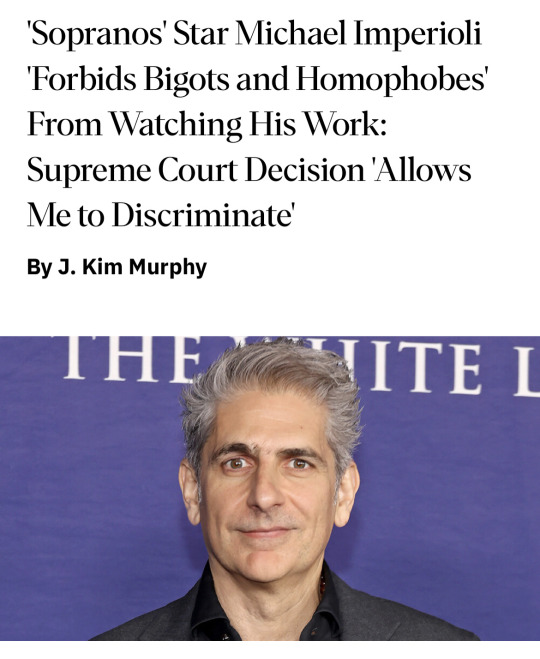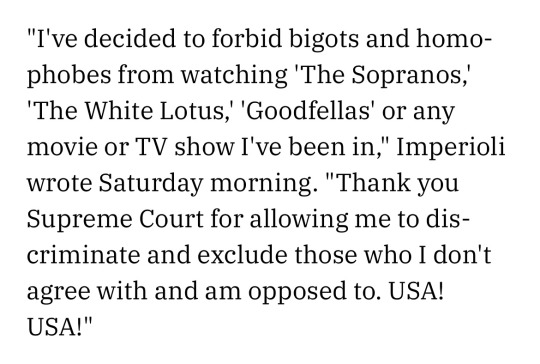#Chief Justice Roberts
Explore tagged Tumblr posts
Text

Trump Weird News - SCOTUS Chief Rebukes Trump For 3rd Time!
#weird news#trump#donald trump#weird#scotus#supreme court#chief justice roberts#impeach#chief judge james boasberg#politics#rebukes trump#immigration
11 notes
·
View notes
Text
Chief justice pushes back against calls to impeach judges who rule against Trump
After President Donald Trump called for the impeachment of a judge who had ruled against the government, Chief Justice John Roberts released a statement.

In an unusual remark on Tuesday, Chief Justice John Roberts chastised President Donald Trump and his supporters for demanding the removal of judges who have rendered decisions that disagree with the administration.
It has been known for more than 200 years that impeachment is not a suitable way to address disagreement over a court ruling. For that reason, the standard appellate review procedure is in place," Roberts said in a statement. See more.........
#john roberts#chief justice roberts#breaking news#google news#bbc news#business news#celebrity news#auto news#crypto news#entertainment news#bitcoin news#good news#usa news#usahoodie#united states#america#united states of america#trump 2024#trump administration#president trump#donald trump#white house
12 notes
·
View notes
Text
LIVE CHIEF JUSTICE ROBERTS REACTION:



#applause and kudos#brilliant#also points out#that the supreme court conservative brain trust faction#has opened the floodgates for a spectrum#of stupid and apparently unforeseen consequences#AGAIN#conservative malarkey on the supreme court#bad jurisprudence#supreme court bogus decisions#lgbtq discrimination#chief justice roberts#justice alito#justice clarence thomas#meanwhile in america
29K notes
·
View notes
Text
1 note
·
View note
Text

#propoganda#snopes#satire#jokes#chief justice roberts#politics#political#us politics#news#donald trump#american politics#president trump#elon musk#jd vance#law
119 notes
·
View notes
Text

Trump Allies Sue John Roberts To Give White House Control Of Court System
A think tank founded by Stephen Miller sued Roberts and the office that administers the judiciary, claiming that the White House should run the federal courts.
Close allies of President Trump are asking a judge to give the White House control over much of the federal court system.
In a little-noticed lawsuit filed last week, the America First Legal Foundation sued Chief Justice John Roberts and the head of the Administrative Office of U.S. Courts.
#donald trump#second term#america first legal foundation#lawsuit#u.s. supreme court#chief justice#john roberts
345 notes
·
View notes
Text

#illegitimate SCOTUS#Seditious Six#Chief Justice John Roberts#Trump sycophant#MAGAt cultist#republican assholes#maga morons#crooked donald#traitor trump#republican party#political cartoons
206 notes
·
View notes
Text

#illegitimate scotus#republican assholes#John Roberts#maga morons#crooked donald#traitor trump#republican hypocrisy#republican party#chief Justice#the emperor’s new clothes#political cartoons
209 notes
·
View notes
Text

#chief Justice#john roberts#illegitimate SCOTUS#The Madness of King Trump#federalist society#republican assholes#maga morons#traitor trump#crooked donald#republican hypocrisy#trump sycophants#maga cultists
109 notes
·
View notes
Text

Trump Weird News - Impeach SCOTUS Justice Roberts TOO!!!
#weird news#trump#donald trump#weird#scotus#supreme court#chief justice roberts#impeach#chief judge james boasberg#politics
0 notes
Text

if Robert Cyger listened/watched this movie he would get so mad he'd punch holes into the wall
#my art#toontown corporate clash#ttcc#chairman#chief legal officer#chief operating officer#chief justice#crystalline#at least my design for her#robert cyger#ottoman#thomas saggs#diane morsecode#john robolts#since it's the ttcc iteration#sorry I've been obsessed with this movie and album for a bit my 4-5 year long obsession strikes yet again
130 notes
·
View notes
Text
This is an important article by Linda Greenhouse, writing in The New York Times. Therefore, the link above is a gift 🎁 link, so anyone can read the article, even if they don't subscribe to the Times.
Below are some excerpts from the article:
To understand today’s Supreme Court, to see it whole, demands a longer timeline. To show why, I offer a thought experiment. Suppose a modern Rip Van Winkle went to sleep in September 2005 and didn’t wake up until last week. Such a person would awaken in a profoundly different constitutional world, a world transformed, term by term and case by case, at the Supreme Court’s hand. To appreciate that transformation’s full dimension, consider the robust conservative wish list that greeted the new chief justice 18 years ago: Overturn Roe v. Wade. Reinterpret the Second Amendment to make private gun ownership a constitutional right. Eliminate race-based affirmative action in university admissions. Elevate the place of religion across the legal landscape. Curb the regulatory power of federal agencies. [...} That was how the world looked on Sept. 29, 2005, when Chief Justice Roberts took the oath of office, less than a month after the death of his mentor, Chief Justice Rehnquist. And this year? By the time the sun set on June 30, the term’s final day, every goal on the conservative wish list had been achieved. All of it. To miss that remarkable fact is to miss the story of the Roberts court. It’s worth reviewing how the court accomplished each of the goals. It deployed a variety of tools and strategies. Precedents that stood in the way were either repudiated outright, as the Dobbs v. Jackson Women’s Health Organization decision did last year to Roe v. Wade and Planned Parenthood v. Casey, or were simply rendered irrelevant — abandoned, in the odd euphemism the court has taken to using. In its affirmative action decision declaring race-conscious university admissions to be unconstitutional, Chief Justice Roberts’s majority opinion did not overturn the 2003 Grutter decision explicitly. But Justice Thomas was certainly correct in his concurring opinion when he wrote that it was “clear that Grutter is, for all intents and purposes, overruled.” Likewise, the court has not formally overruled its Chevron decision. Its administrative-law decisions have just stopped citing that 1984 precedent as authority. The justices have simply replaced Chevron’s rule of judicial deference with its polar opposite, a new rule that goes by the name of the major questions doctrine. Under this doctrine, the court will uphold an agency’s regulatory action on a major question only if Congress’s grant of authority to the agency on the particular issue was explicit. Deference, in other words, is now the exception, no longer the rule. But how to tell a major question from an ordinary one? No surprise there: The court itself will decide. [...] My focus here on what these past 18 years have achieved has been on the court itself. But of course, the Supreme Court doesn’t stand alone. Powerful social and political movements swirl around it, carefully cultivating cases and serving them up to justices who themselves were propelled to their positions of great power by those movements. The Supreme Court now is this country’s ultimate political prize. That may not be apparent on a day-to-day or even a term-by-term basis. But from the perspective of 18 years, that conclusion is as unavoidable as it is frightening.
#us supreme court#18 years of the roberts' court#chief justice john roberts#affirmative action#second amendment#separation of church and state#regulatory agencies#women's reproductive health#linda greenhouse#the new york times#gift link
135 notes
·
View notes
Text
Fucking SCOTUS.
Honestly, I never thought the Dobbs decision would give me *hope,* but obviously SCOTUS decisions *can* be overturned if you work for it.
So let’s do it, gang. Vote Biden. Vote blue all the way down the ballot. Get the AOCs and Bernies in where we can, get the boring middle-of-the-road Democrats in where they’re the only option. Make it possible to reform the Court, to appoint liberal judges, to overturn these bullshit rulings.
Vote. I know he’s old. I know he’s not your first choice. But we won’t get better choices if we don’t keep voting blue.
#vote motherfucker vote!#let’s work to make John Roberts go down in history as the most useless chief justice of the Supreme Court#what do you say?
13 notes
·
View notes
Text
all of these are true of me! check the tags for the us supreme court justices if you dont want to look them up
#chief justice roberts justice thomas justice alito justice stevens justice kagan justice brown jackson justice coney barrett#INHALE justice gorsuch justice sotomayor and justice kavanaugh#and its bc i listen to 5-4 pod that i have this wholly unnecessary information#lefty.txt
8 notes
·
View notes
Text

By JOSH GERSTEIN
05/12/2025 07:39 PM EDT
Chief Justice John Roberts described the rule of law as “endangered” and warned against “trashing the justices,” but speaking in Washington Monday he didn’t point fingers directly at President Donald Trump or his allies for publicly excoriating judges who’ve ruled against aspects of Trump’s agenda.
“The notion that rule of law governs is the basic proposition,” Roberts said during an appearance at Georgetown Law. “Certainly as a matter of theory, but also as a matter of practice, we need to stop and reflect every now and then how rare that is, certainly rare throughout history, and rare in the world today.”
292 notes
·
View notes
Text

one of these things is not like the other
23 notes
·
View notes